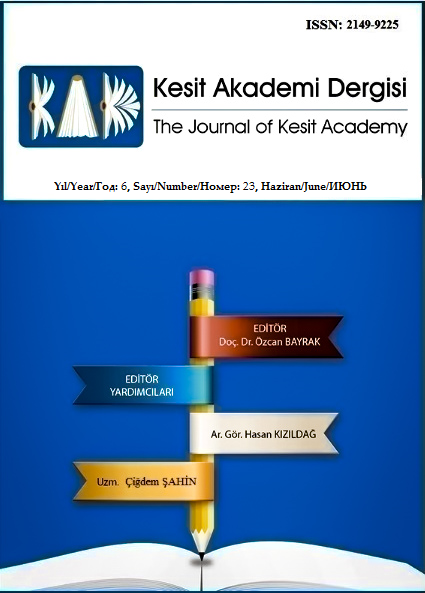Author :
Abstract
Günümüzde özellikle Batı toplumları Çin’in Wuhan kentinden başlayan ve tüm dünyaya yayılan koranavirüsle yoğun bir mücadele sürecinden geçmektedirler. Salgın başladığında özellikle de Batılı liderler, bunun çok abartıldığını, gelip geçici bir hastalık olduğunu hatta kısa zamanda biteceğini iddia ediyorlardı, bu nedenle de ölüm gerçeğinden uzakta kalmaya devam ediyorlardı. Aynı durum ilginç bir şekilde yer ve tarih farklı olsa bile Albert Camus’un “Veba” romanında yaşananlara çok benzemektedir. Fransız filozof Albert Camus’nun romanındaki veba salgını ise Cezayir’in liman şehri Oran’da başlamıştı. Bu veba salgınında olduğu gibi, koranavirüs salgınının Çin’de ortaya çıktığı ilk günlerde, diğer ülkelerde yaşayan bazı uzmanlar da bu hastalıktan daha çok yoksul insanların etkileneceklerini düşünüyorlardı ve özellikle sağlık sistemi kırılgan olan ülkelerde bu salgının daha fazla yayılacağından kontrol edilemeyeceğini iddia ediyorlardı. Hem romanda hem de koronavirüs durumunda insanlar salgının geçici olduğunu düşünmektedir. Bu çalışmada salgının başlangıcından sonuna doğru psikososyal olaylarda benzerlikler ve çok az da olsa farklılıklar ele alınmaktadır.
Keywords
Abstract
Today, especially Western societies are going through an intense struggle with the coronavirus beginning from Wuhan, China, and spreading all over the world. When the epidemic started, especially Western leaders claimed that this was exaggerated, that it was a temporary illness, and that it would end soon, so they remained far from the reality of death. The same situation is interestingly similar to what happened in Albert Camus' novel "Plague" even if the place and the date are different. The plague epidemic in the novel of French philosopher Albert Camus started in the port city of Algeria, Oran. As with this plague epidemic, in the early days of the coronavirus outbreak in China, some experts living in other countries thought that more poor people would be affected by this disease, and claimed that this epidemic could not be controlled, especially in countries with a fragile health system. In both the novel and the coronavirus, people think the outbreak is temporary. In both epidemics, the use of communication devices has increased and the epidemic has accelerated people's transition to a new life cycle. In this study, the similarities and minor differences in psychosocial events from the beginning of the epidemic to the end are discussed.
Keywords
- Aslan, R. (2020). Tarihten Günümüze Epidemiler, Pandemiler ve Covid-19. Ayrıntı Dergi-
- Aslan, R. (2020). Tarihten Günümüze Epidemiler, Pandemiler ve Covid-19. Ayrıntı Dergi- si, 8(85), 35-41.
- Camus, A. (2012). Veba. (Çev: N. T. Öztokat). İstanbul: Can Yayınları.
- -------------- (2014). Sisifos Söyleni. (Çev: T. Yücel). İstanbul: Can Yayınları. İnternet Kaynakları
- URL-1:www.sputniknews.com/yasam/202002041041327763-cinde-koronavirus-uyarisi-yapan- ilk-doktor-once-susturuldu-sonra-hastaliga-yakalandi. Erişim Tarihi: 29.05.2020.
- URL-2: www.turkish.cri.cn/1781/2020/02/26/1s203257.htm. Erişim Tarihi: 02.06.2020
- URL-3: www.wsws.org/tr/articles/2020/04/09/john-a09.html. Erişim Tarihi: 30.05.2019
- URL-5: www.sozcu.com.tr/2020/ekonomi/11-marttan-bu-yana-internet-kullanimi-ne-kadar-artti 5719832/ Erişim Tarihi: 04.06.2020.
- URL-6:www.tr.euronews.com/2020/05/25/covid-19-vaka-sayisinda-dunyada-ucuncu-olan- rusya-da-olum-oran-neden-dusuk. Erişim Tarihi: 03.06.2020
- URL-7: www.bbc.com/turkce/haberler-dunya-52499404. Erişim Tarihi: 04.06.2020URL-8: www.bbc.com/turkce/haberler-dunya-52039922 Erişim Tarihi: 04.06.2020
- URL-9:www.aa.com.tr/tr/dunya/trump-nisanda-havalarin-isinmasiyla-koronavirus- biter/1730167. Erişim Tarihi: 01.06.2020
- IPSOS Coronavirus Outbreak and Society: General Public Opinion Research, 1st Term, 13-16March 2020a (www.ipsos.com/sites/default/files/ipsos_koronavirus-ve-toplum_mart2020- vf_0.pdf) Erişim Tarihi: 07.06.2020
- IPSOS Coronavirus Outbreak and Society: General Public Opinion Research, 3rd Term, 26-30March 2020b (www.ipsos.com/tr-tr/halkin-endise-duzeyi-79dan-15-puan-artis-ile- 94A-output) Erişim Tarihi: 07.06.2020





